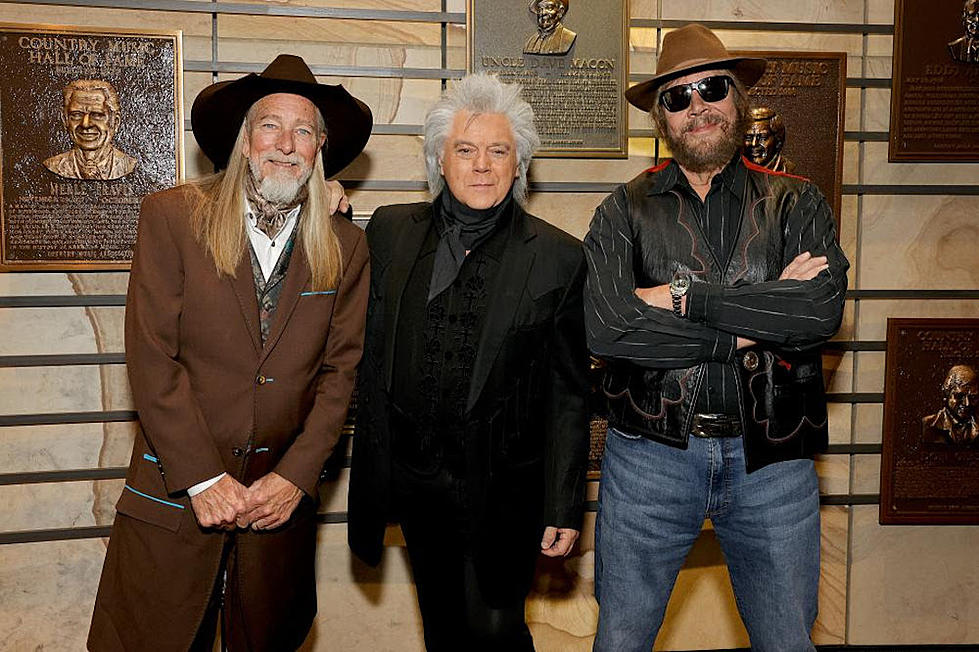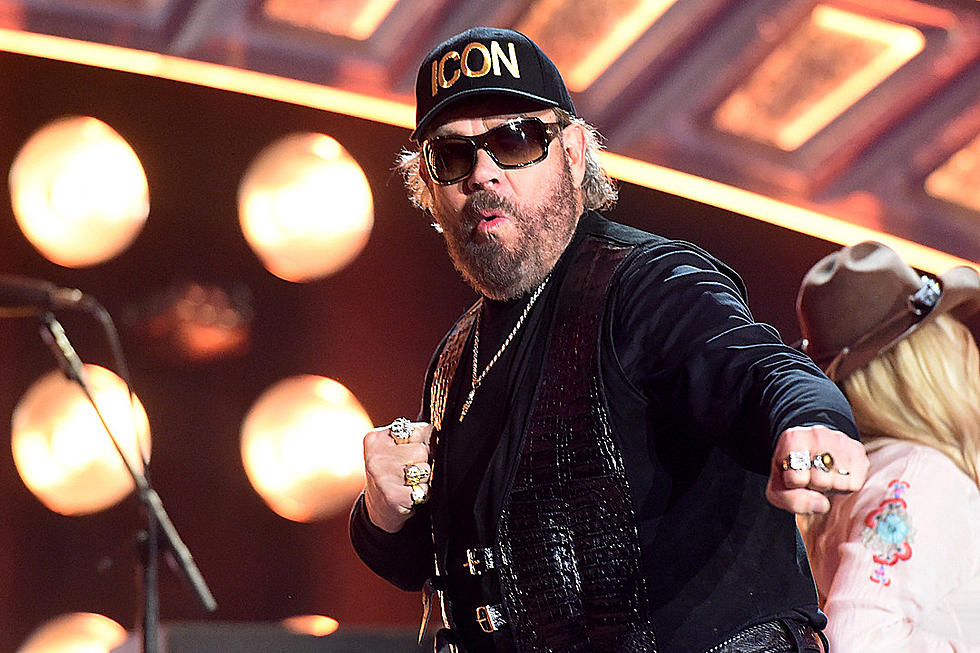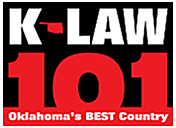
Interview: Marty Stuart Talks New Album ‘Way Out West’ and Keeping Country Music’s Roots Alive
Marty Stuart needs no introduction. The long-time Grand Ole Opry member is one of country music history's biggest champions.
In fact, being a steward of musical legacies has been a theme throughout Stuart's distinguished career, which has included a stint playing with Johnny Cash and eclectic forays into soul, gospel and bluegrass. And the latest Marty Stuart and His Fabulous Superlatives record, 2017's Way Out West, is yet another ambitious sonic chapter.
Produced by Tom Petty and the Heartbreakers guitarist Mike Campbell, Way Out West is a panoramic, picturesque exploration of California-inflected music of the past and present — highlighted by the jangly "Time Don't Wait," the arid-desert blues-twang of "Mojave" and the early rock 'n' roll waltz "Lost on the Desert." In June, Stuart talked The Boot several days after he jammed with Tom Petty and the Heartbreakers at Mountain Jam 2017 on the song "Crawling Back to You."
"They're my favorite rock 'n' roll band in America -- always have been," Stuart says. "England has the [Rolling] Stones, but we got Tom Petty and the Heartbreakers."
In addition to talking about Way Out West, Stuart discussed the future of his TV show, The Marty Stuart Show, and gave an update on his ambitious passion project, the Congress of Country Music Hall.
The Heartbreakers' Mike Campbell produced Way Out West. What was it like working with him from that standpoint, and what did he bring to the music from the production arm?
We were pals from the early '90s. There was a record called Unchained that Johnny Cash did that was part of those Rick Rubin American Recordings. On Unchained, Johnny Cash's backup band was Tom Petty and the Heartbreakers -- and me. So we kind of got to know each other that way. And Campbell and I have remained pals all along; it's the same with Tom.
I knew with Way Out West, we needed to get out of Nashville. We needed to go out west and authentically make this record. I needed that California atmosphere around me: palm trees and blue sky and just that magic that California brings. A change of scene. Mike, I knew, was a good shepherd, because he authentically lives out there, and I knew that he would push us and drive us to a different place sonically. It was just about going into the awning of his vibe, and the California vibe, and I knew that Mike was the perfect host for that. It helped, and I can feel it when I listen to that record.
I needed that California atmosphere around me: palm trees and blue sky and just that magic that California brings. A change of scene.
What I love about Way Out West is that there's all aspects of California music covered. Obviously there's the country element, but you have the '50s rock, a little bit, like the blue skies and swimming pools -- the promise of life back in the '50s and '60s. I really like that. There is a lot of vibe to it.
From being a kid, from the perspective of looking into California from my world in Mississippi when I was that age, I was a sponge. Everything that looked cool to me and sounded cool and felt cool — whether it was fashion or TV shows or go-go girls or twangy surf guitars or whatever, or rhinestone clothes — it all came from that fantasy place called California. It was a bit of a fantasy land for me. When I went out there for the first time, I went, "Well, it is a fantasy land, but it exists." I love California. It just brings a special magic to the proceedings.
Because California has been covered so much in music, how did you want to differentiate your approach to the songwriting and lyrics on this record?
Well, usually as far as country music is concerned, the go-to place is Bakersfield. And the Bakersfield story has been covered and re-covered, and covered and re-covered, so many times, really well.
I took it in my mind to the Mojave Desert and let that become my canvas. That was where I wanted to start from, because the sky is the limit out there. And when you get into the Mojave, by yourself, alone at midnight, just sitting in the Mojave Desert, all of a sudden, the spirit world comes to you. You hear and see strange things out there, stone cold sober, at midnight. [Laughs]
That just became my place. That's where the real California comes to life. Once you get past the bright lights and get into the land and the people, that's where the magic happens.
Musically, what has Chris Scruggs meant to the Superlatives? He's one of the newer members but, obviously, he has a very impressive lineage.
When Paul Martin left our group to go develop his family band, we had no idea how we were going to top what we had accomplished with him. And Chris, he had been on my TV show, we'd used him from time to time, and he was just a world-class musical citizen.
But I can tell you this: From the minute he joined our band, it was like if you had the most powerful rocket in the world, and then all of a sudden, you didn't know that it could even be better, somebody brought a new engine and said, "Watch this." It was like he hot-rodded everything that we had done. His musicianship, his integrity, his presence — he upped our game in every way. We thought we knew Chris Scruggs, but we really didn't know him until we started playing music with him on a daily basis. But he has been an absolute blessing to this band.
It's true: You can know someone's playing, but until they're in the same room and you're seeing if everything gels, you don't ever know.
What's really interesting for me — he really didn't know Earl Scruggs. He only met him one time. [But] I knew Earl from the time I was a young teenager. I knew that family very well, and there's so much that just naturally comes out of Chris' hands and his heart that is so much ... I know where the mantle fell. I know where the Scruggs mantle fell as far as ... because he's got it all. He has so many characteristics that made that family famous in the first place, just naturally. It just comes with his DNA.
That's the magic of genetics. As you were doing Way Out West, what insights did you gain about your own songwriting as the record was coming together? Is there anything in particular?
"Old Mexico," I think, was the first one that I wrote for this record. I actually wrote it for one of the episodes of my TV show, and I held onto it because I thought, "Something's going on there." I laid the song down for a couple years, and when this concept came into focus, I thought about that song. And I went, "You know what, I think I would have the courage to play that song for Marty Robbins and not be ashamed of it." I was like, "That's pretty good."
When the song "Way Out West" appeared on my paper, I started laughing. I'm like, "This makes no sense whatsoever. It is ridiculous, but there's something about it I like." There's a compelling something about it. When the concept came into focus with the Mojave as the canvas, the sky being the limit, all of a sudden, I gave myself, I think, a broader license to write outside the two-minute-and-30-second window of what country songs usually do. My head opened up, and I felt it. I gave myself permission to fly.
We plugged into the roots system of American music, and that's a very powerful place to plug in.
As a creative person, that's so interesting. It is so easy to fall back on what you know. To have those little insights into new arenas and new detours, it's so valuable and gratifying.
Yep. And also, once I had been through the whole system, and we did this record, it was interesting, when I was standing backstage listening to Tom and the Heartbreakers [at Mountain Jam]. All of a sudden, those songs, I went, "Oh, I know where that came from." [Laughs] "I know which palm tree that one fell out of." I could see it more plainly than ever before.
I love Tom's writing. It's like Hank Williams — it's instantly accessible, you know it by the end of the first chorus, and you're singing along by the second chorus. It's very few words, but it makes all the sense in the world. But I understood his writing a whole lot more — and that band, even, more than I ever had — after coming through Way Out West.
I've seen Petty three, four times now. And I saw him a couple weeks ago, too, and it's like, "How do they keep getting better?" Those songs just don't age, and they take on new dimensions.
It's rock 'n' roll at its finest. It's American rock 'n' roll at its finest. There's an evergreen quality about those guys, and there's an evergreen quality about those songs. They wrote from a timeless perspective, and they play from a timeless perspective. It's a sight to behold.
When the concept came into focus ... I gave myself a broader license to write outside the two-minute-and-30-second window of what country songs usually do. My head opened up, and I felt it. I gave myself permission to fly.
You mentioned the TV show earlier. Is that on hiatus because you've been so busy? Are you going to be making new episodes of that at any point?
I did 156 episodes, me and the Superlatives. The mission statement there was to put our arms around the culture of traditional country music inside the walls of Nashville before it completely disappeared off the edge of planet Earth. And we accomplished that. I think there were maybe five or six names on my wish list for the first season that I never got to, or they couldn't do it or didn't want to do it, whatever. But at the end of the 156 episodes and six or seven seasons, you know what? Mission accomplished. Let's move on.
And so, that particular show is in the books now. It's in history books. I love TV, and I think there's another television show in development, probably for another network. But we are absolutely going to go back to the TV cameras in the next couple years, I think.
Speaking of preserving history, you're also working on the Congress of Country Music Hall. Do you have any more updates on that?
Yeah, it's moving. So the collection is in place, in a beautiful warehouse in Philadelphia, Miss. Plans are drawn for the Congress of Country Music Hall. The board is in place. There's money to start with, but we have to raise several million dollars now to complete the project. I think it's a three-to-five-year stretch, but I can tell you, it is 10 miles down the road further than it was three years ago, two years ago, one year ago. It is a reality. It's like a tidal wave that's on the roll now. I'll keep you posted as we go along.
It's so nice to have what you have on display in a place where you can visit it and see it and make it come alive. There's something so magical about that.
Parts of that collection, it toured. It started at the Tennessee State Museum, then it went to the Rock Hall in Cleveland and the Autry Museum in Los Angeles. And pieces have been loaned. But when it was really on tour, I would stand in the shadows and watch people. I would watch the effect that Hank Williams' lyrics or the telegram from Hank Williams' mother to his sister that said, "Come at once. Hank is dead" [had on people]. Or Johnny Cash's report card from Dyess, Ark., or boots Patsy Cline was wearing when she lost her life. I would watch that thing get ahold of people and touch them in their hearts. I saw people cry, I saw people inspired. It's a powerful collection. It's the real stuff.
There just isn't a lot of video of many of those artists, or if there is, there's not that much around. YouTube has helped a little, but it's an area of history that I think was very easily lost if people aren't absorbing it and seeing those things again.
And I think as a band, the Superlatives, our mission was, we build on top of that legacy right there. We carried those things forward into the 21st century: write new songs, do new shows, do television shows, or an extension of that culture to reach beyond.
What it basically amounts to is, we plugged into the roots system of American music, and that's a very powerful place to plug in. It's beyond trend. Like we were talking about Tom's work, it's an evergreen place. If you handle it right, [it's] instant classics, and that's a great place to come from.
Besides all of the touring that you guys have set up for the rest of the year then, are you working on anything else musically or creatively that you can talk about?
Oh yeah. We have about 14 or 15 instrumentals recorded already. I call it a hillbilly surf band record, and it's really good. [Laughs]
It's like I'm 58 years old and starting over again.
Did you guys put that together on the road, or did that come together in a studio session? How did that come together?
It's about two years' worth of songs we've written on the road and then carried to the studio or got together as a garage band and started laughing and having fun like we were 14 years old with our first guitars looking to impress girls. [Laughs] And started writing songs, you know.
Is there anything else you want to add about the record or what you have coming up that we haven't covered?
The thing I've enjoyed about Way Out West is, we invited our traditional audience to follow us, and we did a 40-city run. [We] started in Dublin, and we wound up in Portland, Ore., all the way to the Pacific, basically. We just walked across the continent, and mostly played in rock rooms and smaller venues and places that we had never played before -- in some cases, places people had barely heard of us before, just to start a new audience.
And it has been wonderful, night by night, handshake by handshake, song by song, to watch a new thing start to come to life. I love it. It's like the beginning of a movement almost. A grassroots movement.
There's something so challenging and fun and energetic to do it that way. It's like you're scrapping up early in your career again. That's very cool.
Oh my God, it's like I'm 58 years old and starting over again. I look at the setlist on a nightly basis — there may be three songs from chart radio hits, and the rest of it is new and adventurous stuff. It's a cool night.
Top 10 Country Concept Albums
More From KLAW-FM





![Marty Stuart Honors Tom Petty With ‘Runnin’ Down a Dream’ Cover [WATCH]](http://townsquare.media/site/623/files/2017/10/marty-stuart-petty1.jpg?w=980&q=75)




